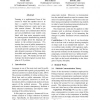Free Online Productivity Tools
i2Speak
i2Symbol
i2OCR
iTex2Img
iWeb2Print
iWeb2Shot
i2Type
iPdf2Split
iPdf2Merge
i2Bopomofo
i2Arabic
i2Style
i2Image
i2PDF
iLatex2Rtf
Sci2ools
ACL
2015
2015
A Frame of Mind: Using Statistical Models for Detection of Framing and Agenda Setting Campaigns
Framing is a sophisticated form of discourse in which the speaker tries to induce a cognitive bias through consistent linkage between a topic and a specific context (frame). We build on political science and communication theory and use probabilistic topic models combined with time series regression analysis (autoregressive distributed-lag models) to gain insights about the language dynamics in the political processes. Processing four years of public statements issued by members of the U.S. Congress, our results provide a glimpse into the complex dynamic processes of framing, attention shifts and agenda setting, commonly known as ‘spin’. We further provide new evidence for the divergence in party discipline in U.S. politics.
| Added | 13 Apr 2016 |
| Updated | 13 Apr 2016 |
| Type | Journal |
| Year | 2015 |
| Where | ACL |
| Authors | Oren Tsur, Dan Calacci, David Lazer |
Comments (0)

